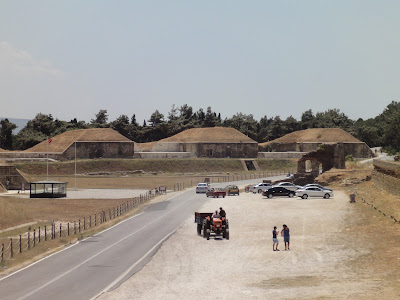One of the most familiar and most clearly visible images of Turkey is the giant “Dur Yolcu" memorial carved onto the hillside above Kilitbahir, depicting a 1915 Turkish soldier holding a rifle in one hand, while pointing towards the inscriptions in Turkish with his other hand:
'Dur yolcu!
Bilmeden gelip bastığın
Bu toprak,
Bu toprak,
bir devrin battığı yerdir.'
'Traveller halt!
The soil you tread
Once witnessed the end of an era.'
The soil you tread
Once witnessed the end of an era.'
This inscription is actually the first few lines of a poem by Turkish poet, Necmettin Halil Onan (1902-1968):
Dur yolcu! Bilmeden gelip bastığın
Bu toprak, bir devrin battığı yerdir.
Eğil de kulak ver, bu sessiz yığın
Bir vatan kalbinin attığı yerdir.
Bu ıssız, gölgesiz yolun sonunda
Gördüğün bu tümsek Anadolu'nda,
İstiklal uğrunda, namus yolunda
Can veren Mehmed’in yattığı yerdir.
Bu tümsek, koparken büyük zelzele,
Son vatan parçası geçerken ele,
Mehmed’in düşmanı boğdugu sele
Mübarek kanını kattığı yerdir.
Düşün ki, haşrolan kan, kemik, etin
Yaptığı bu tümsek, amansız, çetin
Bir harbin sonunda bütün milletin
Hürriyet zevkini tattığı yerdir.
Necmettin Halil Onan (1902-1968)
Below is an English translation of this poem, taken from Australian Government's official ANZAC site:
Stop wayfarer! Unbeknownst to you this ground
You come and tread on, is where an epoch lies; Bend down and lend your ear, for this silent mound
Is the place where the heart of a nation sighs.
To the left of this deserted shadeless lane
The Anatolian slope now observe you well;
For liberty and honour, it is, in pain,
Where wounded Mehmet laid down his life and fell.
This very mound, when violently shook the land,
When the last bit of earth passed from hand to hand,
And when Mehmet drowned the enemy in flood,
Is the spot where he added his own pure blood.
Think, the consecrated blood and flesh and bone
That make up this mound, is where a whole nation,
After a harsh and pitiless war, alone
Tasted the joy of freedom with elation.
This is not a blog about modern Turkish literature, but anyone with some knowledge of the modern history of Turkey during the last years of the Ottoman Empire and the first few decades of the 20th century will understand the meaning of this poem. The fortress village of Kilitbahir, on the European side of the Dardanelles Straits directly opposite the city of Canakkale, has long played a crucial role in any warfares involving the Ottoman Empire due to the village's location at the narrowest point of the Straits of Dardanelles. Anyone who controls the fortress will have control over the shipping traffics between the Aegean and the Black Sea.
The fortress castle of Kilitbahir was built in 1452 by Fatih Mehmet Sultan to control the naval traffics entering the Straits at its narrowest point during the Siege of Constantinople. The triangular-shaped observation tower of the castle is seven storey high, which allows early identification of enemy warships.
During the Gallipoli Campaign of WWI in 1915, the fortress and the surrounding military fortifications came under heavy bombardment from the Allied forces as the Allied naval warships tried to force their way through the blockade of the Dardanelles and enter the Sea of Marmara. The defending Turkish garrison responded by laying layers of mines in the Straits, as well as shelling the Allied warships in the Straits with heavy guns from the bunkers around Kilitbahir.
Nowadays it is difficult to imagine the heavy fighting in those days, when numerous warships were sunk by mines or artillery fires amid the shellings, and thousands of lives were lost. Kilitbahir of today is a peaceful seaside village with a great view of the Dardanelles and a place popular with tourists keen to visit the battlefields of the Gallipoli Campaign. Its well-preserved fortress castle, bunkers and ramparts are now museum detailing the history of the 1915 Allied campaign, with multi-media displays of pictures and artifacts from 1915.
Regular minibuses connect Eceabat with Kilitbahir, from where one can change onto another minibus to Seddulbahir, the southernmost point of the Gallipoli Peninsula. There are also regular car and passenger ferries to/from Canakkale's Cimenlik Kalesi.
During the summer months, a few tea houses and cafes serving simple Turkish food are open for business within walking distance from the Kilitbahir Castle, which enable people like me, who love to look at the marine traffics passing through the Straits over some refreshments or a glass of Turkish tea, a nice place in the shade to sit down and have some quality time counting ships on the Dardanelles.
Copyrights@2012. All text and photos by YC Cheng. All Rights Reserved.









No comments:
Post a Comment